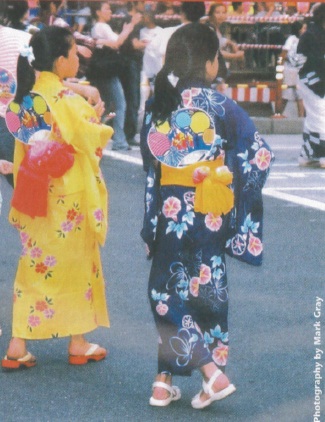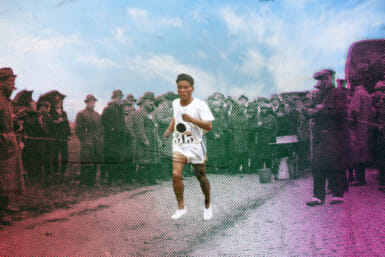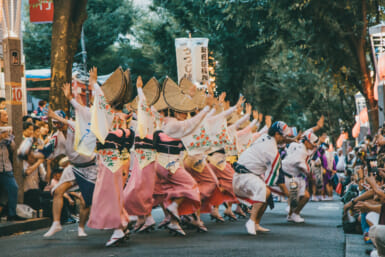In the heat of the summer, Westerners dance when the spirit moves them, but Japanese dance the bon-odori in order to move spirits. The O-bon festival, held across Japan during mid-July or August, depending on regional preference and adherence to lunar or Gregorian calendars, brings family and community together with the dearly departed. If you hear drums after dark in your neighborhood and the sound of people laughing and clapping in the sultry air, you are perfectly welcome to join the dance. Just know that the honored guests are the invisible, floating types.
The celebration of O-bon is believed to have roots in both Buddhism and the secular urge to cherish and recall one’s ancestors. The word ‘O-bon‘, derived from the Sanskrit word ‘Ulambana‘ (or Urabon-e in Japanese), refers to a very unpleasant afterlife predicament of being hung upside down. The story goes that a brilliant disciple of Buddha, Mokuren, had a vision of his own beloved mother in Buddhist hell. Her particular punishment was not inversion, but tenure in the realm of hungry spirits, wherein every morsel she attempted to eat burst into flames before it touched her lips. The South Buddha Diet? Mokuren was horrified; he had always thought of his mother as kind and caring, and not especially gluttonous. It turned out that Mokuren’s mom had focused all her love and generosity on her own son, forsaking others, and in this sense was judged self-indulgent.
Feeling somewhat responsible, Mokuren was determined to alleviate his mother’s suffering. Buddha instructed him to make offerings of clothing and food to the Sangha, or local community of monks, after the rainy season. Mokuren complied, and the merit he amassed transferred to his mother, releasing her to ascend to heaven. Mokuren and the Sangha, were delighted. Together they began to clap and dance, performing the first Bon-Odori.
Perhaps in tribute to Mokuren, most Bon festivals include booths selling yakisoba and roasted corn, snow cones and treats; many also provide free snacks for children. Areas where the traditions hold strong may send out neighbors to knock on your door, lend you some cotton yukata dance threads, and ask if you’d like to participate. Rest assured that the holiday is pretty much all-inclusive, regardless of your religious background; if you have ancestors, you’re in. Bon-odori is sacred to the dead, with simple movements evocative of rural life. The various dances are performed in a circle, with the exception of awa-odori, which is organized by ren, or performance groups. The idea, though, is to welcome the spirits, not to scare them off with your lambada moves. The dance acknowledges the symbolic cycles of life and death, giving and receiving. Along this line of thinking, you are allowed to participate ‘as you are’, whether in yukata and geta or Abercrombie & Fitch.
Walking through Hiroo mid-July, I passed a man burning twigs in a dish at the doorway of his home. This was the mukae-bi, or ‘welcoming fire’ for his ancestors. O-bon is also known as the ‘Festival of Lights’. Traditions vary greatly throughout Japan, but a source of light, such as a lantern or small bonfire (TV static doesn’t count — that’s an evil light), guides the familial spirits home. One of the most poignant ceremonies in Japan occurs at the close of O-bon, when okuri-bi, candles set on small paper boats and launched on a river, lake, or inlet, help lead the spirits back to their presumably improved afterlives.
Children are especially welcome at O-bon festivities. If yours are interested, check with your local temple or shrine to see if dancing is planned; there are few things you can do that will make you feel more part of the community than joining this circle. Alternately, you can check one of the festivals listed below, and inquire about lessons if you’re nervous about the moves (you play Richard Gere, the neighborhood elders will take care of the rest). Who knows, perhaps a few turns around the yagura (taiko drum tower) doing the tanko bushi (one of the most popular dances, symbolizing the coal miner’s life) will bring joy and release to one of your own ancestors.









